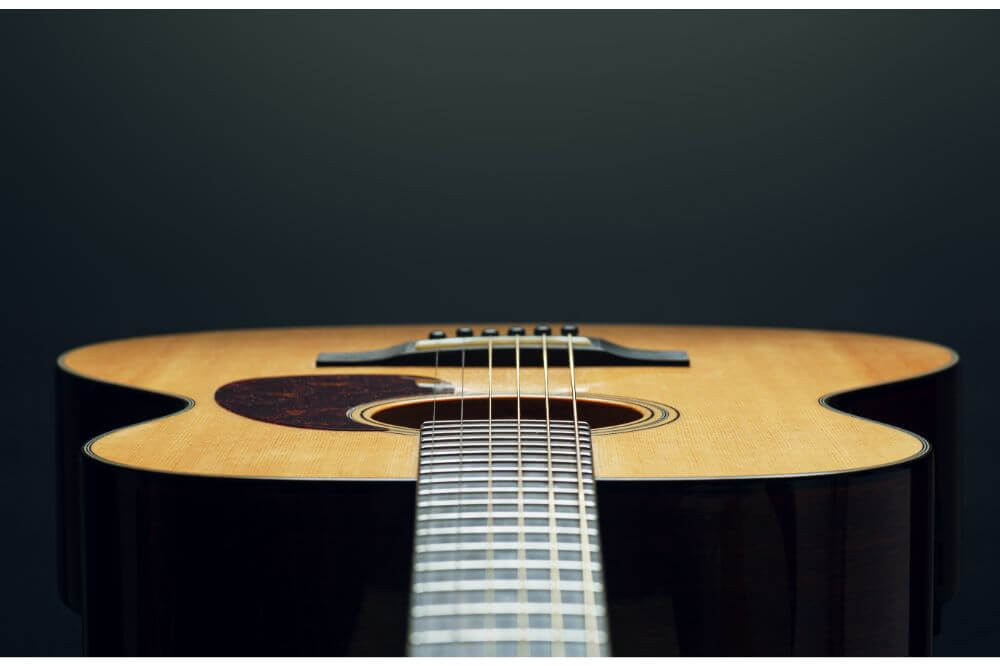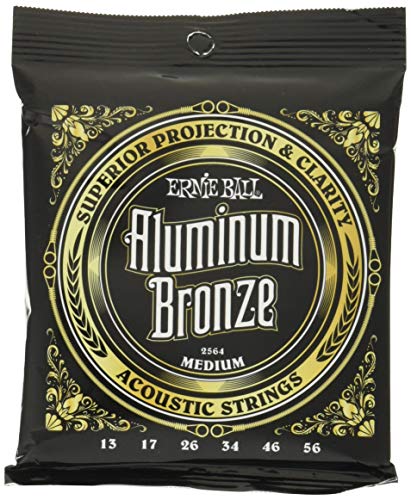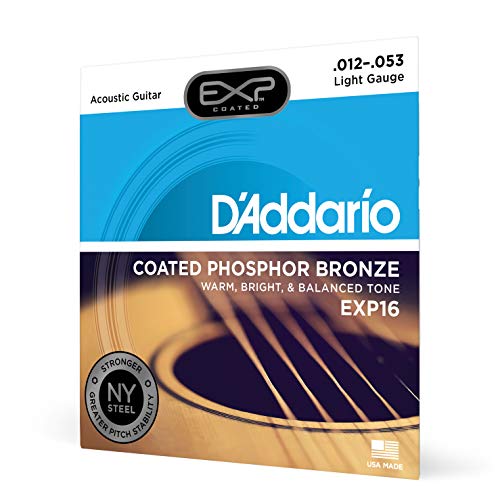Your acoustic guitar is nothing without its strings, so it only makes sense that you’d want to equip it with the highest-quality strings possible. But, with literally thousands of options on the market, finding the right ones for you, let alone a set that works well, can be a challenge.
So, if you’re on the hunt for a shiny new set of guitar strings, you’ve come to the right place. In this article, we will take a look at some of the best guitar strings for acoustic guitar.
Read on for more about the best guitar strings for acoustic guitars that you can find on the market to see which is the ideal option for your preferences, budget, genre, and guitar. Let’s get to it!
Best Guitar Strings For Acoustic Reviews
Elixir Nanoweb HD Light
Starting us off are the Nanoweb HD Light strings from Elixir, which are amongst the best-coated strings for the acoustic guitar. They’re affordably priced and easily accessible, making them an excellent choice for anyone still new to the guitar.
Review
Elixir is the first name for coated guitar strings, and their Nanoweb HD Light strings, which are coated in phosphor bronze, are treated with Nanoweb. Elixir is unique in that they coat the entire string, which is not something that many other companies do, protecting the gaps between each winding from collecting debris and dirt.
This ensures that your strings are kept fresher for longer, but they also experience reduced squeaking from your fingers, which is something that we don’t always think about, but that can make a massive difference in the quality of our sound. Overall, these are some excellent strings and are worth checking out.
The Good
The Elixir Nanoweb HD light strings were developed closely with Taylor Guitars. They are designed to provide a bolder top-end and warmer, richer bottom-end, which some good projection boost provided to the midsection of your sound. The result is a pure, round sound that works well for various genres.
There are several string gauges available for this set, and each of them offers an even level of string tension for total satisfaction.
The Bad
The only real gripe that we have with this set of strings is that they’re pretty expensive for what they are. While they are uniquely coated, there are certainly cheaper options available, so if you’re working on more of a tight budget, consider checking out some of the options that we’ll mention further along in this list. Other than that, Elixir produces an excellent set of acoustic strings.
Pros:
- Fantastic frequency response
- Long-lasting
- Low hand squeak
- Excellent balance between bright and warm
Cons:
- Quite expensive
CHECK LATEST PRICE ON AMAZON.COM
Martin SP Lifespan 2.0
Next on our list are the Martin SP Lifespan 2.0 strings, specially treated for a superior sound and versatile response. Martin is a titan in the world of acoustic guitar and guitar equipment, so it only makes sense that they’d feature on this list.
Review
Martin offers a wide variety of acoustic guitar strings, and Lifespan 2.0 is the brand’s treated option for the SP line. With their ultra-pure steel Superior Performance core wire, these Lifespans strings are available in phosphor bronze and 80/20 sets, with acoustic bariton and 12-string players, also catered for – Martin wasn’t going to leave anyone out of the fun.
If you’re looking for a set of strings that boast the extended lifespan of a coating without the coated feel, then these strings might just be the best option for you. Even after playing them for several hours each day, they hold up their new string brightness, even after stretching and settling in.
The Good
The simple fact is that these Martin strings are a great set of acoustic strings. They make for a durable fit for any genre and style of playing, and while they might not suit you if you’re looking for coated strings, if you don’t mind trying something different, we suggest giving them a try.
One thing to note about these strings is that they sound more dynamically responsive and a little warmer than coated strings while still having an extended lifespan. Yet another reason to like them.
The Bad
There’s only one drawback with these strings: they could use a little more coating. If you’re a player who enjoys a coated feel on strings, you should consider some of the other options.
Pros:
- Great value
- Treated strings
- Versatile response for strummers
- Wear-resistant
Cons:
- It could use more coating
CHECK LATEST PRICE ON AMAZON.COM
Dean Markley Blue Steel
The Dean Markley Blue Steels are up next, which are a set of cryogenically processed strings that offer greater tuning stability and excellent value for money. Their clear, bright tone and reliable consistency make for an excellent set of strings to have on hand.
Review
When pitted against some of the more prominent brands in the industry, Dean Markley strings are often put on the backburner, which, in our opinion, is totally unfair. Still, no matter what you think about Dean Markley’s cryogenic processing, any set of treated acoustic guitar strings that costs less than $10 is worth a closer look.
This process involves liquid nitrogen, which the brand uses for their Blue Steel range, and while it might sound like something straight from a science fiction film, there’s a method to the madness. By freezing the strings to incredibly cold temperatures, then gradually bringing the temperature back up, the strings can benefit from greater tuning stability and frequency response.
The Good
While the frequency response that Dean Markley’s cryogenic processing produces might not be notably better than any other set of coated or treated acoustic strings, there’s no denying that the process delivers a satisfying depth of tone. For over half the price of a standard set of coated strings, this set could be an excellent choice for anyone looking for a good tone on a tighter budget.
These strings also offer a wonderfully consistent sound and stable sound, so you’ll always know what to expect from your acoustic every time you pick it up.
The Bad
Perhaps the only real con worth mentioning is that the cryogenic processing treatment that Dean Markley gives these strings could be little more than a gimmick. These may be just a standard set of coated strings, but that doesn’t mean they’re not a great set.
Pros:
- Fantastic value for money
- The clear, bright tone
- Stable and consistent
- Dependable
Cons:
- It could be just a gimmick
CHECK LATEST PRICE ON AMAZON.COM
Ernie Ball 2564 Aluminum Bronze
These strings from Ernie Bell will do just the trick for acoustic guitar players looking to brighten up their sound a bit. They offer a wonderfully clear tone that improves the tone quality of your instrument, allowing you to project and truly let your guitar sing during those soulful moments.
Review
String up these acoustic strings and ready yourself for a booming performance that sees an incredibly thick, rich low-end paired beautifully with detailed mids and enough shimmer in the top end of your sound to make any chord you play ring out. These strings offer an incredibly bright and rich sound for a comprehensive acoustic sound.
However, these strings are not just for the strummers of the world – the Aluminum Bronze set features excellent natural playability. The aluminum and copper wrappings over the Maraging steel hex core promise a long life even without the coating. There’s a lot to like about these strings, especially their more than affordable price tag.
The Good
The great thing about the Aluminum Bronze strings is that they have a pretty bold sound to them, which is their main selling point. For fingerpickers, they make for an excellent way to achieve some additional presence and brightness in your playing, so if you’re a fan of virtuosity, definitely consider these strings.
The Bad
Unfortunately, if you prefer to play your acoustic guitar using a pick, you might find that these strings are just a little too loud and bold for your liking. When strummed with a pick, they can be almost overpowering in their volume and brightness, muddying the sound of your chords – definitely something to look out for.
Pros:
- Excellent clear tone
- Long-lasting even without coating
- Natural feel
- Great for fingerpickers
cons:
- It may be too loud for those who use a pick
CHECK LATEST PRICE ON AMAZON.COM
D’Addario EXP
Finally, we have the EXP strings from D’Addario, which are, in our humble opinion, the best acoustic guitar strings with reduced string noise for recording. So, whether you’re a professional recording artist or an amateur with a loop pad, these are the strings for you if you want to record your acoustic playing.
Review
Do we even need to introduce these classic guitar strings? D’Addario is a New York-based company with strings that range from a vast array of musical genres, personal preferences, and general tastes. Their EXP strings sit in the coated group but are not too coated.
D’Addario claims that the coating on these strings offers you more of the natural feel you would expect from uncoated strings while still benefiting from the life-extension properties that coated string types offer – and we’re inclined to agree. When it comes to the tone of these strings, their life was far longer than that of an uncoated set, though it would still be wise to change them out quite regularly.
The Good
Overall, there’s no denying that this is an incredible set of strings with a range of benefits for acoustic players of all types to take advantage of. If you are passionate about using a set that will last you as long as possible, then we can safely say that you won’t find a better set of strings than these.
The Bad
The only major issue with these strings is that, for just $5 more, you can get your hands on D’Addario’s Ultra-Premium XT string set, which offers a plethora of additional benefits that you might not see in the EXP strings. Still, it’s not a huge hassle, and if you don’t have the extra cash to spare, these are a great option.
Pros:
- Natural feel
- Affordable
- Long lasting
- Suitable for all genres
Cons:
- You could get the XT set for $5 more
CHECK LATEST PRICE ON AMAZON.COM
Buyer’s Guide
Electric, Acoustic, or Nylon strings?
There are three main categories of guitar strings – electric, acoustic, and nylon. Electric strings are made from metal, usually nickel or steel, with the top three strings made from regular steel and the bottom three made from a steel core and metal wrap. Often nickel has a bright tone and is easy on the frets since nickel is softer than steel.
Acoustic strings are also made from metal, usually phosphor bronze, traditional bronze, nickel, brass, steel, or silk. The top two strings are generally plain steel, with the bottom four wrapped in construction that you might typically see.
Phosphor bronze is also a good choice for acoustic strings. In these strings, phosphor is added to the alloy to extend the lifespan of the string. Manufacturers have been hard at work trying to develop long-lasting strings, and these strings are the result.
Nylon strings are slightly different in that they are looped around the bridge in a simple knot then looped through the tuning roller at the headstock before they are brought up to pitch, which is unconventional for strings.
Acoustic or electric?
Choosing between an electric guitar or acoustic guitar is definitely an important decision that you will have to make when you are first getting into the world of guitars and has to do with how you plan on using your instrument.
There are some significant differences between the two. The primary difference is that an acoustic-electric guitar contains an electronic pickup system, which allows you to connect it to an amplifier or play it acoustically. Even if you do not play out life, there are several benefits to picking up an acoustic-electric.
For instance, a wide variety of players enjoy being able to plug their instruments straight into an amp to record their music. Doing so allows you to quickly sketch down song ideas without having to fret about purchasing and setting up microphones. You’ll also be able to get rid of any potential room noise that might pollute your recordings.
Guitar String Gauges
When it comes to standard guitar tunings, the strings are tuned E, A, D, G, B, and E from top to bottom. The sixth string, which is the low E, is the thickest, while the high E, also called the first string, is the thinnest. Since the thickness of the string is related to how tense it is when it is tuned to pitch, we use thinner strings for high notes and thicker strings for low notes.
If we were to use a high E string with a 0.009=inch diameter in place of the G string, for instance, it would not be able to be wound tight enough to be playable at the correct pitch. This connection between the tension and gauge of the strings is worth keeping in mind when you are considering how gauges affect the tone and playability of your guitar.
Changing your strings
The frequency you decide to change your guitar strings will primarily come down to individual personal preferences. Wiping your strings down with a dry cloth after each of your practice sessions will help them stay fresh, and there are also several special cleaners that you’re able to use to make sure that your strings are in the best condition possible.
Of course, as time goes on and as you continue to play your instrument, your guitar will lose the brightness in its strings, and they’ll start to feel dull and grubby. When this happens, you might have just to grin and bear them, but if you’re like most players, nobody will fault you for wanting the freshest sounds possible – strings are at their brightest when they’re new.
Still, you might find that they only play better once they have had some time to settle down after a couple of hours of being played. In this scenario, the best thing to do is experiment and find what works for you.
The great thing is that acoustic guitar strings are really not expensive, and there are a number of excellent sets that are highly affordable and readily available to try. And, if you find a set that works, you could treat yourself to a more expensive set later down the line once you’ve become more confident in your playing.
Maintaining acoustic guitar strings
It’s not difficult to keep your acoustic strings in good shape, but it’s essential that you take care of them as much as possible. We recommend that you keep a cloth handy and wipe down your strings after every playing session to ensure that they last as long as possible.
Washing your hands before you start playing can help prevent string oxidation, which will boost their lifespan. You should also consider investing in a string winder – these are inexpensive tools that speed up the process of changing out your strings to make your life just a little bit easier.
Buying strings in bulk – purchasing several sets at once – can be a clever, budget-friendly move, especially where light gauges break more frequently. What’s more, keeping an extra set of strings on hand and a few single high-register strings in case of an emergency can save your life in a pinch, and it’s a great habit to get into.
FAQs
How often should acoustic strings be changed?
There’s really no universal answer to this question, and the frequency at which you change out your acoustic guitar strings will depend on a wide range of individual factors. However, we can provide you with some insight into what will shorten the lifespan of your strings.
If you sweat a lot while you play, you will wear your strings out as your sweat is acidic. Your strings will eventually give out due to extreme strain if you are playing frequently and aggressively. The same goes for changing the tunings of your strings frequently, and finally, playing in smoky environments or while smoking and wearing your strings out.
When should I change my guitar strings?
You’ll know that it’s time for a string change when you have a hard time getting your guitar in tune and making sure that it stays in tune and when your strings start to show rust or discoloration. If the string wraps are unwinding and exposing the core, or you’re experiencing ‘dead’ tones, then a change would also be best.
Do acoustic-electric guitars need different strings?
Most acoustic electrics, including some nylon-string models, come with piezo pickups. The strings’ vibrations are converted to electrical signals using an integrated preamp. Since these are non-magnetic systems, string materials may have less impact on your sound, and regular acoustic or classical guitar strings will work fine.
Are acoustic and classical guitars the same?
The primary distinction between these two guitars is the kind of music associated with them. Secondly, classical guitars are fitted with nylon strings. At the same time, acoustics generally have steel strings, and using steel strings on a guitar meant for nylons can cause severe damage, so definitely don’t try that!
Final Thoughts
And there you have it – five of the top options for guitar strings for your acoustic guitar. All of these options have something special to offer, and which pack you choose will come down to your own personal preferences, budget, and what sound quality you want.
If we were forced to make a selection from the above options, we would have to say our favorite is the Ernie Ball 2564 Aluminum Bronze strings. We love their excellent clear tone. If you are a fingerpicker, you will enjoy the natural feel and the fact that they last a long time, even though they are not coated.
We hope this review has helped you in your quest for great acoustic guitar strings and that you will enjoy making music with them.

























